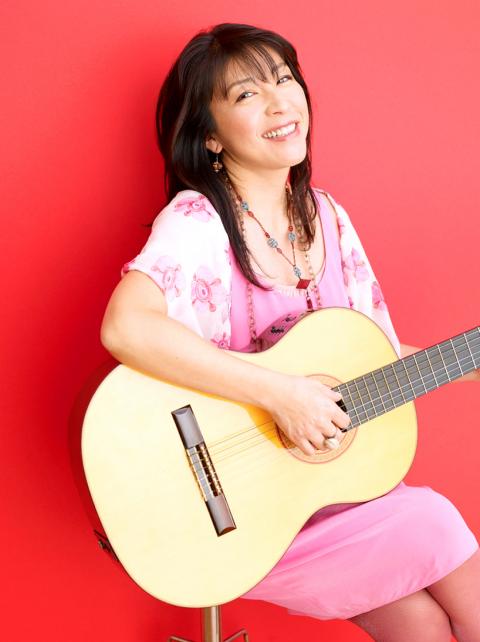When you’re in need of comfort and relaxation, Japanese-Brazilian bossa nova diva Lisa Ono can deliver soothing sounds like no one else.
“Singing and playing music heal my mind and relax my body,” the 49-year old singer told the Taipei Times in an e-mail interview earlier this week. “I am glad that audiences around the world would feel same.”
As part of her 2011 world tour, she will perform three concerts here next month. She appears at Taipei’s Sun Yat-sen Memorial Hall (台北國父紀念館) on Thursday, at Taichung Chungshan Hall (台中市中山堂) on Oct. 8, and at Kaohsiung Chihteh Hall (高雄至德堂) on Oct. 9.

Photo Courtesy of Yu Kuang Music
Born in Brazil, Ono moved with her family to Japan when she was 10. Since then, she has divided her time between the two nations, immersing herself in the two disparate cultures. Influenced by her father who is a club owner, Ono started singing and playing the guitar at 15.
She released her debut album Catupiry in 1989 and won fame soon after with her enchanting mixture of a warm voice, comforting music and charismatic smile.
As the premier bossa nova songstress in Asia, she has released 27 albums over the past two decades, many of them blending genres that include French chanson, samba, jazz, hula, Arabian music and Asian folk. She has performed with top musicians such as Antonio Carlos Jobim and Joao Donato.
“There are many beautiful, wonderful and impressive songs in the world. What matters is not their ‘genres’ but the chance to encounter these songs,” Ono said. “I am often surprised to see these songs fitting the rhythm of bossa nova.”
Last year, Ono released Asia, reinterpreting Asian classics with bossa nova. The album includes two Chinese-language tracks: When Will You Come Again (何日君再來) and Tuberose (夜來香).
“I remembered seeing the audience singing Chinese songs together at my first Taiwan concert. It was a pleasant experience that I cannot forget it,” Ono said, adding that she would include Chinese-language songs for the upcoming concerts.
Ono said that despite her eclectic interests, she often revisits her Brazilian influences.
“I have many drawers in my experiences which overflow with my memories of Brazilian life, nature, environment, and bossa nova songs,” Ono said. “Brazilian people are geniuses who know how to find pleasure in their life. I do that too and it’s very simple.”

May 26 to June 1 When the Qing Dynasty first took control over many parts of Taiwan in 1684, it roughly continued the Kingdom of Tungning’s administrative borders (see below), setting up one prefecture and three counties. The actual area of control covered today’s Chiayi, Tainan and Kaohsiung. The administrative center was in Taiwan Prefecture, in today’s Tainan. But as Han settlement expanded and due to rebellions and other international incidents, the administrative units became more complex. By the time Taiwan became a province of the Qing in 1887, there were three prefectures, eleven counties, three subprefectures and one directly-administered prefecture, with

It’s an enormous dome of colorful glass, something between the Sistine Chapel and a Marc Chagall fresco. And yet, it’s just a subway station. Formosa Boulevard is the heart of Kaohsiung’s mass transit system. In metro terms, it’s modest: the only transfer station in a network with just two lines. But it’s a landmark nonetheless: a civic space that serves as much more than a point of transit. On a hot Sunday, the corridors and vast halls are filled with a market selling everything from second-hand clothes to toys and house decorations. It’s just one of the many events the station hosts,

Among Thailand’s Chinese Nationalist Party (KMT) villages, a certain rivalry exists between Arunothai, the largest of these villages, and Mae Salong, which is currently the most prosperous. Historically, the rivalry stems from a split in KMT military factions in the early 1960s, which divided command and opium territories after Chiang Kai-shek (蔣介石) cut off open support in 1961 due to international pressure (see part two, “The KMT opium lords of the Golden Triangle,” on May 20). But today this rivalry manifests as a different kind of split, with Arunothai leading a pro-China faction and Mae Salong staunchly aligned to Taiwan.

Two moves show Taichung Mayor Lu Shiow-yen (盧秀燕) is gunning for Chinese Nationalist Party (KMT) party chair and the 2028 presidential election. Technically, these are not yet “officially” official, but by the rules of Taiwan politics, she is now on the dance floor. Earlier this month Lu confirmed in an interview in Japan’s Nikkei that she was considering running for KMT chair. This is not new news, but according to reports from her camp she previously was still considering the case for and against running. By choosing a respected, international news outlet, she declared it to the world. While the outside world